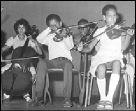
File
A youthful orchestra.Justin Whyte, Senior Staff Reporter
When the director of the North Western Chorale from Montego Bay, Audley Davidson, recently presented the oratorio Creation by Hayden, he could not find an organist or pianist in the second city capable of playing that major work.
Angela Elliott of the Music House Studio, Devon Road, St. Andrew, tried to put it in proper perspective. "When I was growing up, almost every house had a piano and children grew up with music around them. Now this has changed, as instruments become more expensive and music is no longer thought of as a lucrative subject. Government needs to give assistance to students who show talents in music," she said.
Mrs. Elliott also said that students who want to be musicians should be trained from about age four, so that they can be adequately prepared for advanced studies. "Sometimes students doing a pre-college course come to be trained with no knowledge of the piano. What can one do at this stage?" she asked.
Another reason, Mrs. Elliott suggested, was that there are several students who are trained to high levels, but after training go to other fields or overseas where it is more profitable to be a musician.
Among them is Mark Foskin, a graduate from the late Jean Anderson's Music Studio. "Although I was a teacher then and should have returned to the classroom, I could not return. It is impossible to live on the salary offered by the Ministry of Education. So I went to the hotel. We are paid up to $2,000 an hour and it depends on your length of service," he said.
A classical musician, who plays to the grade 7 or 8 (top grades from grade 1) levels, earns $700 to do a rehearsal lasting two hours or more. To perform at a funeral or wedding, he or she is paid $3,000. The professional musician charges $1,200 per rehearsal and between $5,000 and $30,000 for a performance at a wedding, concert or funeral. Those teaching in government institutions are paid at public sector scales.
Meanwhile, a pop musician who plays for a low-profile show is paid $10,000 to $20,000, while musicians who back artistes for a high profile show receives up to $30,000 each.
The situation is not limited to Jamaica. John Fletcher, organist, music educator and Associated Board of the Royal Schools of Music representative in Barbados, has the same situation on his hands. "Here in Barbados youngsters are trained to a certain level in classical music and then they go off to other jobs that will bring in more money and sometimes even going into pop bands," he said.
As a matter of fact, they cannot stay in the Caribbean. I myself encourage them to go overseas for exposure, but they never return," he said.
Mr. Fletcher also explained that 30 years ago he advised the Government of Barbados to invest in a classical string quartet which would cater to students who had just left music schools and colleges. They could then spend a year teaching children and performing, thus building up a generation of musicians, but this was not entertained - and still has not been. Mr. Fletcher also feels that "Government talk too much, they need to act more".
At the moment Jamaica is without a national youth or adult orchestra and there is no hope for one to be formed in the near future. There are functioning ones, including the Dr. Olive Lewin-run youth orchestra and an orchestra founded by the National Chorale of Jamaica with approximately 20 musicians. There are also a number of school orchestras being formed, including Immaculate Conception High School and the Holy Childhood High School in St. Andrew.
Over in Montego Bay, there is the Herbert Morrison Technical School band, directed by Carl Matthews. It has been established for over 20 years and has not only performed as a band, but has been able to feed other bands on the north coast with musicians.
Major Joe Williams, former director of music at the Jamaica Defence Force (JDF) and now director and music tutor of the Immaculate Conception High School Band, told The Gleaner that there is a major problem. "Once students reach the sixth form they leave the school for studies overseas or just get involved in other areas," he said.
However, he feels that if the different music entities work together and are willing to release students, a national youth orchestra could be formed, which will eventually act as a feeder group for a national adult orchestra. He also feels that the arts in general, music being no exception, needs sponsorship to buy musical instruments, music scores and to pay resource persons to teach the students. Maurice Gordon, Associated Board of the Royal Schools, London, representative for Jamaica and music educator on Grafton Road, Vineyard Town, laments that so many students start to play the piano, but as they reach grade 5 the numbers dwindle. "Here music is not seen as a profitable profession, so those who continue beyond grade 5 either go away to study and remain after their studies are complete or go into other lucrative fields," he said. He also explained that many remain here, but music becomes their leisure time activity. "You can see someone becoming a doctor or a teacher here, but not a full-time musician. They just couldn't exist on what they receive for jobs done," Mr. Gordon explained.

















